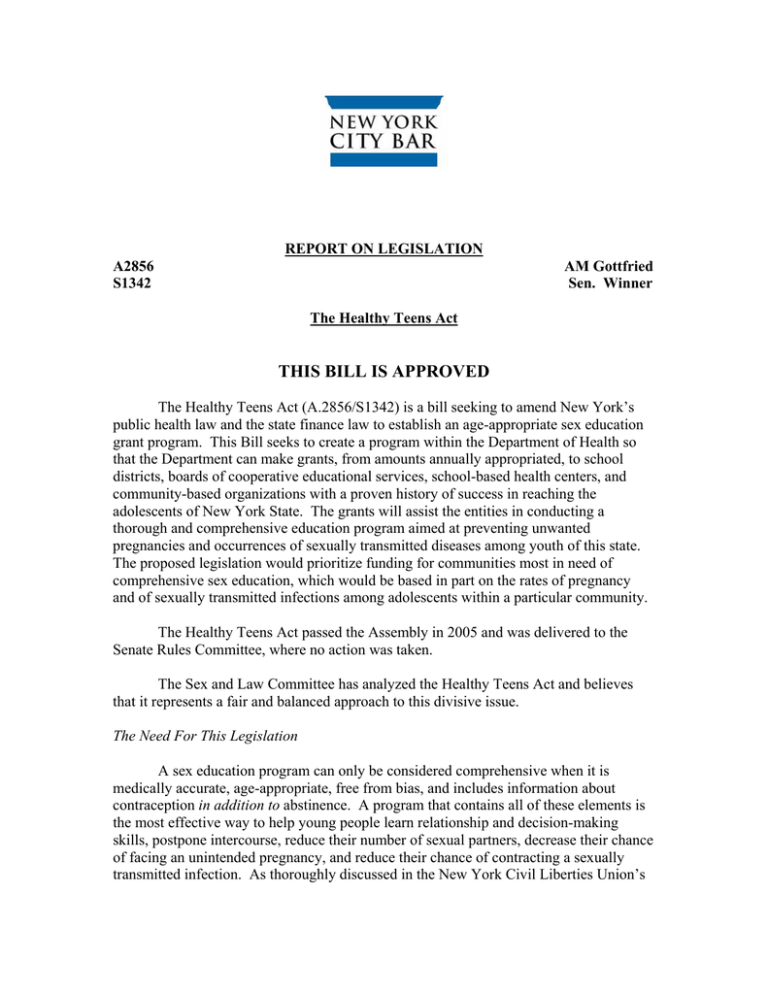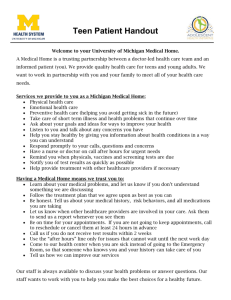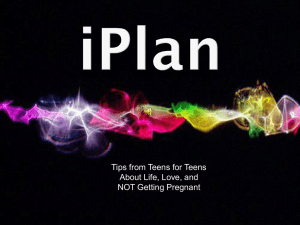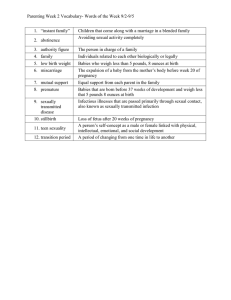The Healthy Teens Act. - New York City Bar Association
advertisement

REPORT ON LEGISLATION A2856 S1342 AM Gottfried Sen. Winner The Healthy Teens Act THIS BILL IS APPROVED The Healthy Teens Act (A.2856/S1342) is a bill seeking to amend New York’s public health law and the state finance law to establish an age-appropriate sex education grant program. This Bill seeks to create a program within the Department of Health so that the Department can make grants, from amounts annually appropriated, to school districts, boards of cooperative educational services, school-based health centers, and community-based organizations with a proven history of success in reaching the adolescents of New York State. The grants will assist the entities in conducting a thorough and comprehensive education program aimed at preventing unwanted pregnancies and occurrences of sexually transmitted diseases among youth of this state. The proposed legislation would prioritize funding for communities most in need of comprehensive sex education, which would be based in part on the rates of pregnancy and of sexually transmitted infections among adolescents within a particular community. The Healthy Teens Act passed the Assembly in 2005 and was delivered to the Senate Rules Committee, where no action was taken. The Sex and Law Committee has analyzed the Healthy Teens Act and believes that it represents a fair and balanced approach to this divisive issue. The Need For This Legislation A sex education program can only be considered comprehensive when it is medically accurate, age-appropriate, free from bias, and includes information about contraception in addition to abstinence. A program that contains all of these elements is the most effective way to help young people learn relationship and decision-making skills, postpone intercourse, reduce their number of sexual partners, decrease their chance of facing an unintended pregnancy, and reduce their chance of contracting a sexually transmitted infection. As thoroughly discussed in the New York Civil Liberties Union’s legislative memo in support of the Healthy Teens Act1, comprehensive sex education is particularly important given New York’s high incidence of unintended pregnancies, sexually transmitted diseases such as gonorrhea, and HIV/AIDS. Yet, currently in New York State, the only funding for sexuality education is provided by federal and state matching programs that prohibit the teaching of any methods to reduce the risk of pregnancy, other than abstinence until marriage. Federal regulations for these “abstinence-only” programs permit mention of contraceptives only to highlight their failure rates. It is up to each local schools district to decide whether to provide students additional sex education instruction.2 This is difficult to do without a mandate or funding stream. The Committee believes that New York has a responsibility to offer comprehensive and accurate information to our young people. By ignoring the reality of teen sexual activity and presenting only one option to teens, the “abstinence-only” model fails to protect sexually active young people from unintended pregnancy and disease. Activity in Other States Many other states have comprehensive sex education programs in place, and, in fact, some states have gone even further and rejected federal funds from “abstinenceonly” programs. For example, in New Jersey, Governor Corzine recently rejected the federally funded “abstinence-only” programs. In an October 24, 2006 letter from the Commissioners for the New Jersey Department of Health and Senior Services and the Department of Education to U.S. Department of Health and Human Services Secretary Michael Leavitt, the State of New Jersey informed the federal government of its decision, explaining that the “abstinence-only” guidelines contradict the core curriculum of the comprehensive sex education program that New Jersey has had in place for more than 25 years. The Governor’s office went on to caution that accepting federal “abstinence-only” dollars might ultimately cost the State more money because students may require additional sex education to clarify the misinformation that is taught in “abstinence-only” programs.3 The Practical Effect Of The Healthy Teens Act This law is extremely balanced in its approach. Among other things, the bill would require sex education programs to: (i) be age-appropriate and medically accurate; (ii) teach that abstinence is the only sure way to avoid pregnancy and sexually transmitted infections; (iii) provide accurate, unbiased information about the benefits and side effects of all contraceptives and barrier methods in preventing pregnancy and sexually 1 See New York Civil Liberties Union legislative memo on the Healthy Teens Act, available at www.nyclu.org/leg_m13_2005.html, and footnotes contained therein. 2 Id. 3 See Siecus, Sexuality Information and Education Council of the US, Policy Updates, October 2006, available at http://www.siecus.org/policy/PUpdates/pdate0285.html. According to Siecus, New Jersey joins Maine, Pennsylvania and California in deciding to reject “abstinence-only” funding. transmitted infections; (iv) teach skills for responsible decision-making concerning sexual and intimate relationships; (v) discuss the influence of alcohol and drug use on decision-making; (vi) allow for discussion concerning the role of religious, ethical and moral values in sexual and intimate relationships; (vii) encourage parental involvement and family communication about sexuality; and (viii) help students develop healthy attitudes, strong self-esteem and valuable life skills in all of these areas. In addition to improving the emotional and physical health of New York State’s young people, the Healthy Teens Act will also have positive economic effects by, among other things, reducing New York’s health care costs and limiting the funds necessary to clarify misinformation from “abstinence-only” programs.




